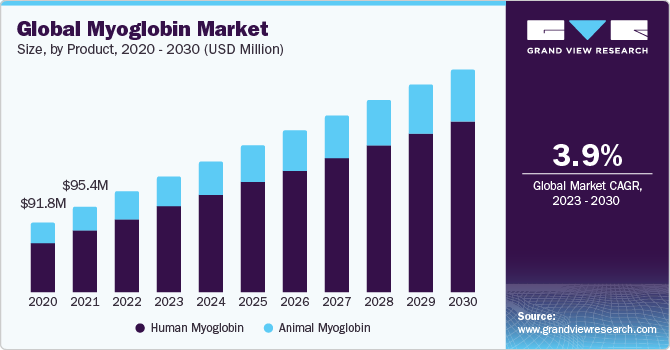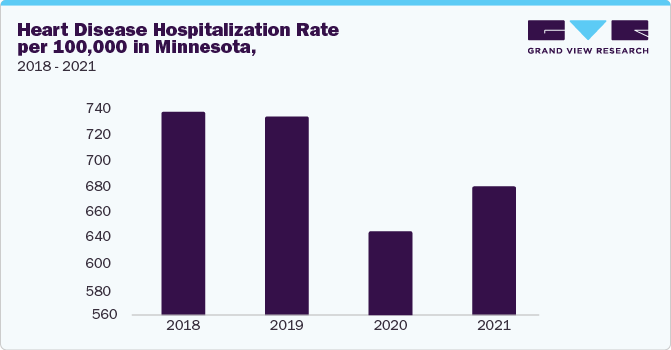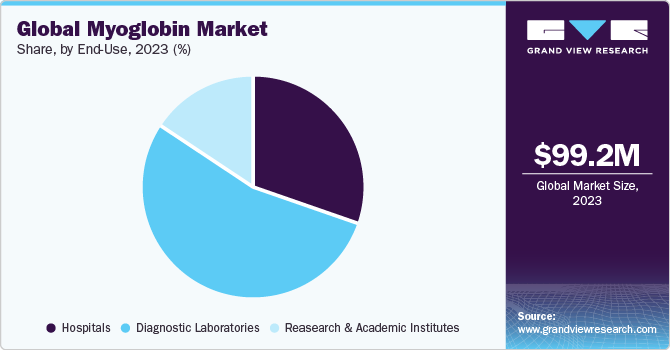Myoglobin Market Size & Trends
The global myoglobin market size was valued at USD 99.2 million in 2023 and is expected to grow at a compound annual growth rate (CAGR) of 3.9% from 2024 to 2030. An increasing influx of funding from both public and private organizations dedicated to research and development (R&D) is anticipated to boost market growth. This surge in financial support can be attributed to the rising recognition of myoglobin's pivotal role in various sectors, including healthcare. Public organizations, such as government research agencies and health foundations, recognize the critical importance of myoglobin in understanding and treating diseases related to muscle health and oxygen transport.

The COVID-19 pandemic exerted a notable negative impact on the myoglobin market. As the world struggled with the public health crisis, resources, research focus, and financial investments were largely diverted toward combating the immediate threat of the virus. This redirection significantly hampered ongoing myoglobin-related research, clinical trials, and development efforts. Laboratories and research facilities faced operational challenges due to lockdowns, restricted mobility, and a scarcity of essential supplies, hindering the progress of studies about myoglobin's applications and potential advancements. Moreover, the economic downturn and financial uncertainties resulting from the pandemic led to a reduction in funding available for non-COVID-19 research, directly impacting the myoglobin market's growth and slowing the pace of innovation and exploration in this field. The disruption in supply chains also affected the production and distribution of myoglobin-related products, further impeding market growth.
The increasing prevalence of cardiovascular diseases (CVDs) is a powerful growth driver for the myoglobin market. Cardiovascular diseases, including myocardial infarctions and heart failure, are a significant global health concern, affecting a substantial portion of the population. For instance, as per the Heart Failure Society of America report, the prevalence of heart failure is expected to increase from 6.5 million Americans to >8 million by 2030. Myoglobin, a vital protein found in cardiac and skeletal muscles, plays a pivotal role in diagnosing and monitoring cardiac conditions. The increasing incidence of CVDs necessitates more efficient and timely diagnostic measures to evaluate heart health and detect anomalies. Myoglobin serves as a critical biomarker for early detection of myocardial damage, enabling swift medical intervention and potentially improving patient outcomes.
Product Insights
Based on the product, the myoglobin market is segmented into human myoglobin and animal myoglobin. The human myoglobin segment held the largest market share in 2023. The human myoglobin has become increasingly important in medical research and clinical applications. Myoglobin, a hemoprotein primarily found in muscle tissues, serves as an indispensable biomarker for a range of medical conditions, notably in the field of cardiology.

It is a vital constituent in diagnostic assays designed to detect and monitor myocardial infarctions and other cardiovascular disorders. Moreover, human myoglobin's relevance extends beyond cardiovascular health, encompassing its use in understanding muscular and neuromuscular diseases, aiding in the evaluation of muscle injuries, and contributing to studies on exercise physiology.
End-user Insights
Based on end use, the myoglobin market is segmented into hospitals, diagnostic laboratories, and research and academic institutes. The hospital segment is expected to witness robust growth, primarily fueled by the essential role of myoglobin in diagnostics within a hospital setting. Hospitals serve as primary hubs for patient care, and the demand for accurate and timely diagnostics is continually escalating. Myoglobin assays and tests play a pivotal role in swiftly identifying myocardial damage, aiding in the early diagnosis of heart-related issues such as myocardial infarctions or heart attacks.

The immediate availability of myoglobin-based tests in hospitals is critical for quick decision-making by healthcare professionals, facilitating prompt and appropriate interventions. As healthcare systems strive to enhance patient outcomes and reduce morbidity and mortality rates associated with cardiovascular diseases, the hospital segment's growth is propelled by the increasing integration of myoglobin assays in hospital protocols and the constant need for efficient diagnostic tools within these crucial medical institutions.
Regional Insights
North America dominated the market in 2023. Rising awareness of cardiovascular health and the prevalence of heart-related diseases in the region has heightened the demand for myoglobin-based diagnostics. Moreover, North America's well-established healthcare infrastructure and research ecosystem provide a conducive environment for the development and adoption of myoglobin-based diagnostic technologies. Additionally, ongoing advancements in medical technology, including point-of-care testing, are further fueling the demand for myoglobin assays, enhancing their accuracy and accessibility. The region's commitment to cutting-edge healthcare solutions and its focus on improving patient outcomes make North America a prime market for myoglobin, with the potential for sustained growth as research and innovation continue to flourish in the healthcare sector.
Competitive Insights
Key players operating in the market are Biomerieux, Beckman Coulter, Siemens Healthcare Diagnostics, Roche Diagnostics Corp, Randox Laboratories, Abbott Diagnostics, Ortho-Clinical Diagnostics, Alere, Boditech Med, and Singulex. In December 2022, Ergo Bioscience, a startup from Argentina, announced the development of plant-based versions of animal ingredients using precision fermentation. This includes myoglobin and casein. In November 2022, Ergo Bioscience partnered with Aethera Biotech to scale up its precision fermentation bioprocesses. The partnership will focus on improving the biotech processes for producing animal-free myoglobin and casein.














